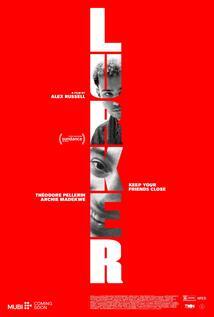

The debut feature by TV writer turned director Alex Russell follows a twenty-something clothing store clerk named Matthew (Théodore Pellerin) who falls in with a rising pop star named Oliver (Archie Madekwe), instantly transforming from a nobody, working retail, living with his grandma, to part of a hip in-crowd, working on a behind-the-scenes music doc, and living an enviable life, at least to those covet being part of an in-crowd. However, all is not as rosy as it seems to Oliver fans who are now starting to ask for selfies with Matthew, too. We watch as Matthew and Oliver's relationship changes over the course of several shifts in power dynamics. Russell's movie is less of a Slatburm/Talented Mr. Ripley spin than a straight-up coming-of-age story about how awkward contemporary young men relate to each other and the greater society.
Watching this with a crowd of younger folks who were clearly resonating with the movie a great deal more than I was, I couldn't help but think I was now experiencing what a 55-year-old, cynical guy must have felt in 1985 watching The Breakfast Club. Everything just felt so pathetic and unimportant to me that it was hard to keep my focus on the movie. This is not to say that the picture rings false notes or that the performances are unworthy of praise. Lurker conveys many truths, both universal and timeless, about being young and seeking acceptance; it's just that movies on these themes used to be about people in high school. Watching twentysomethings struggling with these issues just feels sad, at least to someone my age.
It doesn't help that this picture, like so many of its indie contemporaries, looks like utter dogshit. Russell and cinematographer Pat Scola made the effort to shoot on 16mm film, resulting in the same flat, bland, underlit "film look" that seems to be coveted by many directors these days. Even though one can easily make digital photography look this shitty—hell, you can do it with an Instagram filter—there's a cachet to shooting and releasing a movie on film, regardless of what it looks like. Of course, all the characters in this movie are engaged in doing this very thing: creating random, ugly visual content that they think looks cool, only to tire of it almost instantly and start looking for the next thing to occupy their short attention spans. So one can certainly make the argument that the film's look is entirely appropriate for its subject. But I'm about as interested in that conversation as I am in the exchanges between these characters, which is not much.
Alex Russell's debut about the relationship dynamics of male twentysomethings looking for acceptance captures universal and timeless truths, but the world of the characters and the film's visual look are so off-putting that it's hard (for an old guy like me) to care.




